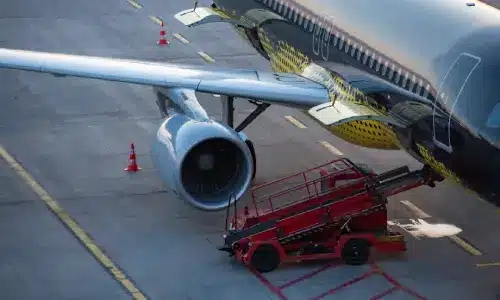
Our dedicated team of South Carolina aviation accident attorneys is here to guide you through the legal process and fight for the compensation you deserve.
Your Trusted South Carolina Aviation Accident Attorneys
Aviation accidents, while rare, can have catastrophic consequences. Whether you’ve been injured in a commercial airline crash, a private plane accident, or a helicopter incident, navigating the legal landscape in the aftermath can be daunting.
That’s where the experience of a seasoned South Carolina aviation accident attorney becomes invaluable.
Understanding Aviation Accidents in South Carolina
South Carolina’s skies are bustling with activity. From major international airports like Charleston International Airport to regional facilities such as Greenville-Spartanburg International Airport and numerous general aviation airfields, our state sees a significant volume of air traffic daily.
While air travel is generally safe, accidents can and do occur.
Common causes of aviation accidents include:
- Pilot error
- Mechanical failure
- Air traffic control mistakes
- Weather-related issues
- Design or manufacturing defects
- Improper maintenance
- Bird strikes
- Runway incursions
Each of these factors can lead to different types of accidents, from runway overruns to mid-air collisions. Understanding the cause is crucial in determining liability and pursuing a successful claim.
The Importance of Prompt Legal Action
In South Carolina, as in most states, there are strict time limits for filing a personal injury or wrongful death claim following an aviation accident. This is known as the statute of limitations.
According to South Carolina’s personal injury statute of limitations, you have three years from the date of the accident to file a lawsuit.
Be aware that aviation accident cases involving government entities, such as military aircraft or planes operated by public universities, often have a shorter statute of limitations. Under South Carolina law for claims against government entities, you may only have two years to file a claim
South Carolina’s statute of repose for product liability claims sets a maximum of ten years from the date of sale to file a claim, regardless of when the injury occurred.
Why Choose Our South Carolina Aviation Accident Law Firm?
At the CEO Lawyer Personal Injury Law Firm, we bring a wealth of experience and resources to your aviation accident case. Here’s why we stand out:
- Focused Experience: Our team includes attorneys well-versed in aviation law, knowledgeable about FAA regulations, international air laws, and state-specific statutes.
- Comprehensive Investigations: We work with a network of aviation professionals, including former pilots, air traffic controllers, and aircraft engineers, to thoroughly investigate the cause of your accident.
- Personalized Attention: Every aviation accident is different. That’s why we provide personalized attention and a custom legal plan to help you get the maximum compensation possible.
- No Upfront Costs: We operate on a contingency fee basis, meaning you don’t pay unless we win your case.
- Proven Track Record: Our firm has successfully handled numerous complex personal injury cases, securing substantial settlements and verdicts for our clients.
Getting Through the Complex Aviation Laws
Aviation accident cases are often more complex than other types of personal injury claims. They may involve multiple jurisdictions, international laws, and federal regulations.
Our South Carolina aviation accident law firm is well-versed in these intricacies, including:
- The Montreal Convention: This international treaty governs many aspects of air travel liability for international flights.
- The Federal Aviation Act: This comprehensive body of law regulates all aspects of civil aviation in the United States.
- The General Aviation Revitalization Act (GARA): This federal law provides certain liability protections for manufacturers of general aviation aircraft and components.
Understanding these laws and how they interact with South Carolina state laws is crucial for building a strong case. Our attorneys stay up-to-date with the latest developments in aviation law to ensure you receive the most effective legal representation possible.
Types of Aviation Accidents We Handle
Our South Carolina aviation accident attorneys have experience with a wide range of aviation-related incidents, including:
- Commercial airline accidents
- Private plane crashes
- Helicopter accidents
- Charter flight incidents
- Air tour accidents
- Airport ground accidents
- In-flight injuries
- Cargo plane accidents
Regardless of the type of aviation accident you’ve been involved in, we have the knowledge and resources to handle your case effectively.
Determining Liability in South Carolina Aviation Accidents
Identifying the responsible parties in an aviation accident is a critical step in pursuing compensation. Depending on the circumstances of the accident, liability may fall on:
- The Airline: Commercial carriers have a high duty of care to their passengers. They can be held liable for accidents caused by employee negligence, improper maintenance, or failure to follow safety protocols.
- Pilots: Pilot error is a leading cause of aviation accidents. This can include mistakes in navigation, failure to respond appropriately to weather conditions, or operating the aircraft while fatigued or under the influence.
- Aircraft Manufacturers: Defective aircraft designs or manufacturing can result in serious accidents. Manufacturers may face legal liability if their products contribute to such incidents.
- Maintenance Providers: Companies responsible for maintaining and repairing aircraft can be held liable if their negligence leads to mechanical failures causing an accident.
- Air Traffic Controllers: Mistakes or miscommunications by air traffic control can lead to devastating accidents. In these cases, the federal government (which employs air traffic controllers) may be liable.
- Airport Operators: For accidents occurring on the ground, such as runway incursions or collisions during taxiing, the airport authority may bear some responsibility.
- Other Passengers: In some cases, the actions of other passengers (such as interfering with the flight crew or bringing prohibited items onboard) can contribute to accidents.
Our South Carolina aviation accident attorneys will thoroughly investigate all potential sources of liability to ensure all responsible parties are held accountable.
When Can a Passenger Be at Fault?
While it’s less common, there are situations where a passenger’s actions can contribute to an aviation accident or their own injuries. These might include:
- Interfering with the flight crew
- Attempting to open emergency exits during flight
- Bringing hazardous materials onboard
- Failing to follow safety instructions (such as not wearing a seatbelt when instructed)
In such cases, the concept of comparative negligence may come into play. South Carolina follows a modified comparative negligence rule, which means that if you’re found to be more than 50% at fault for your injuries, you may be barred from recovering compensation.
However, it’s important to note that even if you believe you may have been partially at fault, you should still consult with a South Carolina aviation accident attorney. The complexities of aviation law mean that there may be factors you’re unaware of that could affect your case.
Compensation in South Carolina Aviation Accident Cases
Victims of aviation accidents may be entitled to various forms of compensation, depending on the specifics of their case. These can include:
- Medical Expenses: This covers all related medical costs, including emergency treatment, hospital stays, surgeries, rehabilitation, and future medical care.
- Lost Wages: If your injuries prevent you from working, you may be compensated for lost income, including future earning capacity.
- Pain and Suffering: This non-economic damage compensates for the physical pain and emotional distress caused by the accident.
- Emotional Distress: Aviation accidents can be traumatic experiences, often leading to conditions like PTSD. Compensation may be available for psychological treatment and related suffering.
- Loss of Enjoyment of Life: If your injuries prevent you from enjoying activities you once loved, you may be entitled to compensation.
- Wrongful Death: In tragic cases where a loved one has died in an aviation accident, family members may be able to pursue a wrongful death claim. This can include compensation for loss of companionship, lost future income, and funeral expenses.
- Punitive Damages: These are intended to serve as a deterrent and a form of punishment. They may be awarded in cases where the defendant’s actions were particularly egregious, such as those involving reckless disregard for safety or malice.
What to Expect During The Claims Process
When you choose the CEO Lawyer Personal Injury Law Firm to handle your aviation accident case, we’ll guide you through every step of the process:
- Initial Consultation: We’ll meet with you to discuss the details of your case, answer your questions, and explain your legal options.
- Investigation: Our team of personal injury lawyers in South Carolina will conduct a thorough investigation, gathering evidence such as flight data records, maintenance logs, and eyewitness accounts.
- Detailed Analysis: We’ll consult with aviation professionals to build a strong case, demonstrating how the accident occurred and who should be held responsible.
- Claim Filing: We’ll file all necessary paperwork within the required deadlines, ensuring your right to compensation is protected.
- Negotiation: Our skilled negotiators will work to secure a fair settlement from the responsible parties’ insurance companies.
- Litigation: If a fair settlement can’t be reached, we’re prepared to take your case to court and advocate for you before a judge and jury.
Throughout this process, we’ll keep you informed and involved, ensuring you understand what’s happening with your case every step of the way.
Frequently Asked Questions About Aviation Accidents in South Carolina
What is the difference between general aviation and commercial aviation in South Carolina?
- General aviation refers to all forms of flying that are not commercial. This includes private planes, small business aircraft, and even some experimental aircraft.
- Commercial aviation involves aircraft used for transporting passengers or cargo for a fee. Airlines, charter companies, and cargo carriers fall under this category.
The specific laws and regulations governing aviation accidents can vary depending on whether the incident involved general or commercial aviation.
Can I sue the airline if my luggage was lost or damaged during a flight to South Carolina?
Yes, you can typically sue an airline for lost or damaged luggage. However, there are specific rules and limitations in place. Airlines often have liability limits, and you may need to provide documentation of the value of your lost or damaged items.
What if the accident occurred during an international flight?
International flights are often governed by the Montreal Convention, which sets specific rules for liability and compensation. These cases can be particularly complex, involving multiple jurisdictions and international law.
Can I still receive compensation if the accident was partially my fault?
Possibly. South Carolina follows a modified comparative negligence rule. You can still recover damages if you’re found to be 50% or less at fault, but your compensation may be reduced.
What if the accident involved a military aircraft?
Accidents involving military aircraft fall under different rules and may involve claims against the federal government. These cases often have shorter deadlines and specific procedures that must be followed.
What if I was injured at the airport rather than on a plane?
Accidents that occur at airports, such as slips and falls, luggage cart incidents, or injuries from malfunctioning equipment, are also covered under personal injury law. The liable party might be the airport authority, an airline, or a third-party vendor. We can help determine liability and pursue compensation for these types of incidents as well.
Contact Our South Carolina Aviation Accident Attorneys Today
If you or a loved one has been involved in an aviation accident in South Carolina, don’t face this challenging time alone. The CEO Lawyer Personal Injury Law Firm is here to provide the skilled legal representation you need to secure the compensation you deserve.
Don’t let the complexity of aviation law or the power of big airlines intimidate you. With our firm on your side, you’ll have a dedicated team working tirelessly to ensure justice is served.
Contact us today at (833) 254-2923 to schedule your free, no-obligation consultation. We’re available 24/7 to take your call and start working on your case immediately.
There’s no fee unless we win your case. Don’t wait – the sooner you reach out, the sooner we can start fighting for the compensation you deserve.
Let the CEO Lawyer Personal Injury Law Firm be your advocate in this difficult time. Your recovery is our priority.





